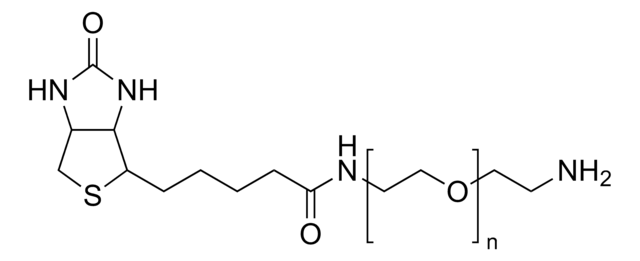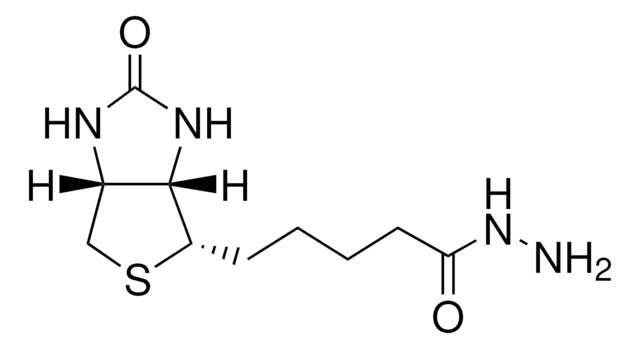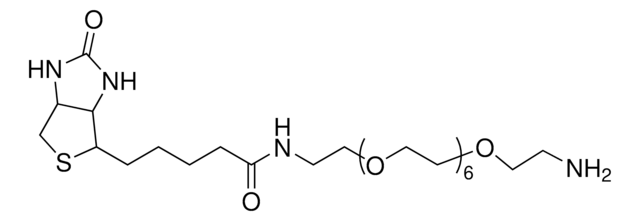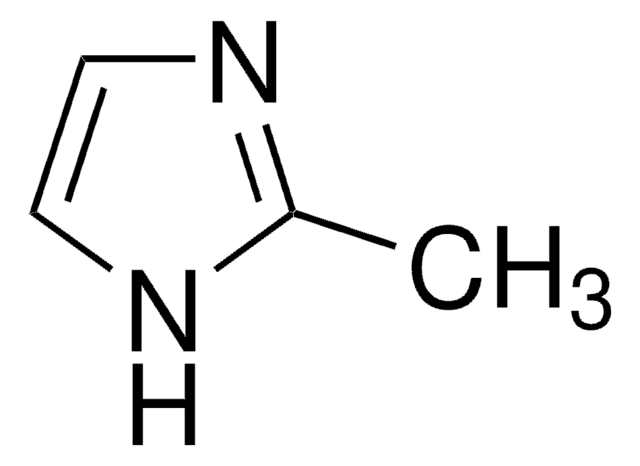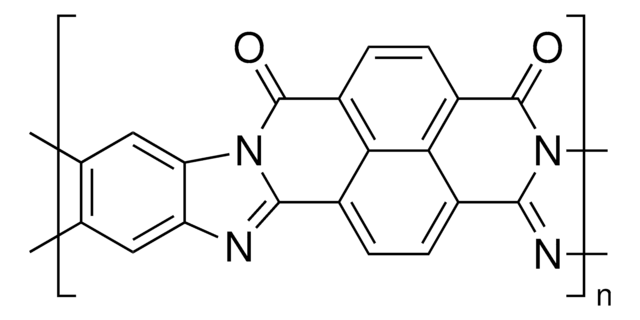689882
O-(2-Aminoethyl)-O′-[2-(biotinylamino)ethyl]octaethylene glycol
≥95% (oligomer uniformity)
Synonim(y):
Biotin-PEG amine (n = 8)
About This Item
Polecane produkty
Poziom jakości
Próba
≥95% (oligomer uniformity)
Postać
powder
masa cząsteczkowa
average Mn 700
przydatność reakcji
reagent type: cross-linking reagent
Ω-koniec
amine
α-koniec
biotin
temp. przechowywania
−20°C
ciąg SMILES
NCCOCCOCCOCCOCCOCCOCCOCCOCCOCCNC(=O)CCCC[C@@H]1SC[C@@H]2NC(=O)N[C@H]12
InChI
1S/C30H58N4O11S/c31-5-7-37-9-11-39-13-15-41-17-19-43-21-23-45-24-22-44-20-18-42-16-14-40-12-10-38-8-6-32-28(35)4-2-1-3-27-29-26(25-46-27)33-30(36)34-29/h26-27,29H,1-25,31H2,(H,32,35)(H2,33,34,36)/t26-,27-,29-/m0/s1
Klucz InChI
UHIKHSATVJGWOI-YCVJPRETSA-N
Powiązane kategorie
Opakowanie
Kod klasy składowania
11 - Combustible Solids
Klasa zagrożenia wodnego (WGK)
WGK 3
Temperatura zapłonu (°F)
Not applicable
Temperatura zapłonu (°C)
Not applicable
Środki ochrony indywidualnej
Eyeshields, Gloves, type N95 (US)
Certyfikaty analizy (CoA)
Poszukaj Certyfikaty analizy (CoA), wpisując numer partii/serii produktów. Numery serii i partii można znaleźć na etykiecie produktu po słowach „seria” lub „partia”.
Masz już ten produkt?
Dokumenty związane z niedawno zakupionymi produktami zostały zamieszczone w Bibliotece dokumentów.
Produkty
Progress in biotechnology fields such as tissue engineering and drug delivery is accompanied by an increasing demand for diverse functional biomaterials. One class of biomaterials that has been the subject of intense research interest is hydrogels, because they closely mimic the natural environment of cells, both chemically and physically and therefore can be used as support to grow cells. This article specifically discusses poly(ethylene glycol) (PEG) hydrogels, which are good for biological applications because they do not generally elicit an immune response. PEGs offer a readily available, easy to modify polymer for widespread use in hydrogel fabrication, including 2D and 3D scaffold for tissue culture. The degradable linkages also enable a variety of applications for release of therapeutic agents.
Devising biomaterial scaffolds that are capable of recapitulating critical aspects of the complex extracellular nature of living tissues in a threedimensional (3D) fashion is a challenging requirement in the field of tissue engineering and regenerative medicine.
Nasz zespół naukowców ma doświadczenie we wszystkich obszarach badań, w tym w naukach przyrodniczych, materiałoznawstwie, syntezie chemicznej, chromatografii, analityce i wielu innych dziedzinach.
Skontaktuj się z zespołem ds. pomocy technicznej